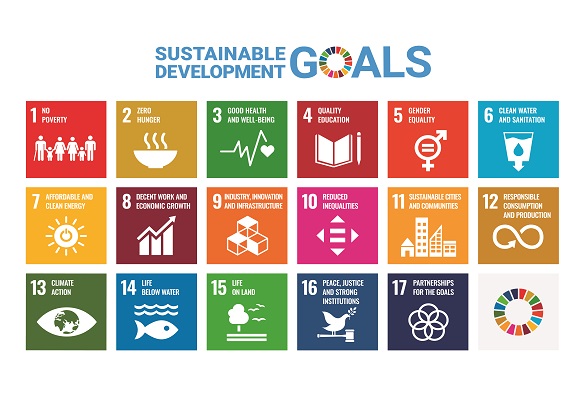
In January 2020 the University signed the Sustainable Development Goals (SDG) Accord, which makes a commitment to put the United Nations Sustainable Development Goals at the heart of all the University’s activities.
The goals are focussed on tackling the huge social, environmental and economic challenges we face. From eradicating poverty and hunger, to building a just and peaceful society, which ensures an environmentally sustainable planet, good health and well-being, and inclusive economic growth.
The University of Liverpool makes an enormously positive impact on these goals through the world-leading research carried out, the work its graduates go on to do, as well as the institutions civic role. Much of the University’s response to Covid-19, for example, directly contributes to SDG3 Good Health and Wellbeing. This includes deploying expertise to develop a vaccine, for example, and supporting the NHS by providing accommodation and manufacturing PPE. Many staff and students are also contributing their time and expertise on the front line of medicine. There is more the University can do to build on this work, continuing to align research, education, civic engagement and professional services activities with the SDGs so that we can further develop our contribution and demonstrate this impact using the global framework.
This also includes looking at the ways in which the University’s activities may negatively impact on the goals. Campus facilities, for example, that support teaching and research, use raw materials, energy and consumables contributing to climate change, resource depletion, waste generation and biodiversity loss. Greenhouse gas emissions and air pollution are also created through the transportation of goods to and from the campus, business travel and the staff and student commute.
To help minimise these negative impact, the University has developed and implemented a UKAS accredited Environmental Management System (EMS). Whilst much great work is being done, including the carbon saved as a result of the University’s onsite Energy Centre providing heat and power to the main campus, the EMS sets out the true scale of the significant challenges we face.
Sustainability Board
To meet these challenges the University has reviewed its sustainability governance and introduced a new Sustainability Board chaired by Director of Finance, Nicola Davies. The Sustainability Board reports directly to the Senior Leadership Team. The University is also very fortunate to have a fantastic community of world-leading academics, students and professional services staff who can bring an enormous amount of knowledge, expertise and energy to tackling these issues. The Sustainability Team has established seven multi-disciplinary working groups made up of a cross-section of academic staff, professional services, students and the Liverpool Guild of Students. The following groups report into the Sustainability Board:
- Climate Action Group
- Biodiversity Action Group
- Culture and Community Working Group
- Responsible Consumption and Production Working Group
- Sustainable Campus Development Working Group
- Travel and Transport Working Group
- Education for Sustainable Development Teaching & Learning Working Group
Projects
The working groups use the UN SDGs as a framework and support the University’s Environmental Management System. They will be working to identify strategies and initiatives, including:
- Designing a route map to minimise University campus emissions
- Developing a Biodiversity Action Plan and making space for nature on campus
- Finding and supporting ways to travel to and from and around campus in a way that minimises environmental impact
- Investigating models for adopting a living lab approach ; combining research, impact and delivery
- Reducing the University’s use of natural resources and considering the impact of our purchasing decisions, across the supply chain
- Ensuring that environmental and social sustainability is embedded into the curriculum so that students can become true global citizens
- Embedding sustainability into the University’s decision-making process and its activities so that it becomes the new norm
There will be further, more detailed updates about the work of each of these groups over the next few months with information about how you can get involved.
Making an Impact
Vice Chancellor, Professor Dame Janet Beer, will be delivering a talk about the importance of the SDGs to the University’s research at the Making an Impact event in June. See here for further information: https://www.liverpool.ac.uk/researcher/making-impact/impact-2020/programme/ There will also be an SDG workshop and an SDG podcast launched at this event.
For more information about the University’s commitment to the SDGs please visit: https://www.liverpool.ac.uk/feature/sustainability/sustainable-development-goals/
For more information about the University’s sustainability work please visit: https://www.liverpool.ac.uk/sustainability/